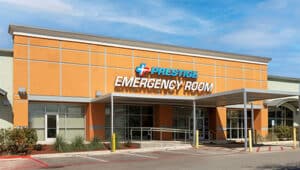Disclaimer to all patients:
The CMS (Center for Medicare and Medicaid Services) does not yet recognize Freestanding Emergency Centers which is why Prestige Emergency Room cannot currently accept the following medical insurances: Medicaid
Basic Steps in the Billing Process:
- Your visit will consist of (2) bills, which are sent to your insurance carrier. These bills cover the cost of the building, equipment, tests, clinicians, medication, supplies and the for the physician who treated you, a member of Prestige Emergency Consultants.
- The insurance company will process the claim and send you and EOB (Explanation of Benefits), this is not a bill. The EOB will show you a very large amount that will be negotiated down (please ignore the initial amount).
- Once the final bill is agreed upon by Prestige ER and the insurance carrier, the amount will be applied to your in-network ER benefits. For plans that have an in-network out of pocket maximum, the balance will not exceed that.
- Any remaining patient responsibility will be sent to you in the form of a bill from Prestige ER.
Note: Prestige Emergency Room does not balance bill under any circumstances. You will never pay more here than you would pay at a traditional hospital ER.
For billing questions or to set up a payment plan arrangement, please call 210-504-9122 (8 a.m-4 p.m).
Health Insurance Policy Misconceptions:
Misconception #1: “You shouldn’t have gone to an out of network ER.”
In fact, you should go to the nearest ER available at the time of your need. Under EMTALA, hospitals and FECs (Freestanding Emergency Centers) are required to provide stabilizing treatments for patients with emergency medical conditions. Under the Prudent Layperson Standard, you can receive care for any medical condition that has sudden onset symptoms and is becoming more severe (including sever pain) if you could reasonably expect the following to happen if you don’t seek care:
- Placing the health of an individual or (for a pregnant woman, the health of the mother and unborn child) in serious jeopardy.
- Serious impairment to bodily functions.
- Serious dysfunction of any bodily organ or part.
Misconception #2: “We paid your ER claim at the correct rate because the ER is out of network and their charges are excessive.”
Per Federal H.R.3590, your medical insurance must pay the greatest of the 3 rates below:
- The amount negotiated with in-network providers for the emergency service furnished.
- The amount for the emergency service calculated using usual, customary, and reasonable amount for the geographical area. (You can use fairhealthconsumer.com to determine this amount)
- The amount that would be paid under Medicare
Our charges are comparable to other emergency healthcare providers within this geographic area.
Misconception #3: “The ER facility used incorrect procedure and/or diagnosis codes.”
We use the ACEP guidelines (American College of Emergency Physicians) for coding, which is the industry standard in coding for ER.
NEW Surprise Billing Notice:
Read below and click on the link provided for more information:
Effective January 1, 2022, the No Surprises Act, which Congress passed as part of the Consolidated Appropriations Act of 2021, is designed to protect patients from surprise bills for emergency services at out-of-network facilities or for out-of-network providers at in-network facilities, holding them liable only for in-network cost-sharing amounts. The No Surprises Act also enables uninsured patients to receive a good faith estimate of the cost of care.
Billing Disclosures – Your Rights and Protections Against Surprise Medical Bills
When you get emergency care or get treated by an out-of-network provider at an in-network hospital or ambulatory surgical center, you are protected from surprise billing or balance billing.
What is “balance billing” (sometimes called “surprise billing”)?
When you see a doctor or other healthcare provider, you may owe certain out-of-pocket costs, such as a copayment, coinsurance, and/or a deductible. You may have other costs or have to pay the entire bill if you see a provider or visit a healthcare facility that isn’t in your health plan’s network.
“Out-of-network” describes providers and facilities that haven’t signed a contract with your health plan. Out-of-network providers may be permitted to bill you for the difference between what your plan agreed to pay and the full amount charged for a service. This is called “balance billing.” This amount is likely more than in-network costs for the same service and might not count toward your annual out-of-pocket limit.
“Surprise billing” is an unexpected balance bill. This can happen when you can’t control who is involved in your care — like when you have an emergency or when you schedule a visit at an in-network facility but are unexpectedly treated by an out-of-network provider.
You are protected from balance billing for:
Emergency Services
If you have an emergency medical condition and get emergency services from an out-of-network provider or facility, the most the provider or facility may bill you is your plan’s in-network cost-sharing amount (such as copayments and coinsurance). You can’t be balanced billed for these emergency services. This includes services you may get after you’re in stable condition unless you give written consent and give up your protections not to be balanced billed for these post-stabilization services.
Additionally, Texas law protects patients from surprise medical bills in emergencies and when a patient receives covered medical services from an out-of-network provider at an in-network facility. The law applies to state-regulated insurance plans, including the state employee or the teacher retirement systems. This law does not apply to non-emergency healthcare or medical services when a patient elects in advance and in writing to receive those services from an out-of-network provider and when the out-of-network provider provides the patient with written disclosure.
Certain Services at an In-Network Hospital or Ambulatory Surgical Center
When you get services from an in-network hospital or ambulatory surgical center, certain providers there may be out-of-network. In these cases, the most those providers may bill you is your plan’s in-network cost-sharing amount. This applies to emergency medicine, anesthesia, pathology, radiology, laboratory, neonatology, assistant surgeon, hospitalist, or intensivist services. These providers can’t balance bill you and may not ask you to give up your protections not to be balance billed.
If you get other services at these in-network facilities, out-of-network providers can’t balance bill you, unless you give written consent and give up your protections.
You’re never required to give up your protection from balance billing. You also aren’t required to get care out-of-network. You can choose a provider or facility in your plan’s network.
When balance billing isn’t allowed, you also have the following protections:
- You are only responsible for paying your share of the cost (like the copayments, coinsurance, and deductibles that you would pay if the provider or facility was in-network). Your health plan will pay out-of-network providers and facilities directly.
- Your health plan generally must:
- Cover emergency services without requiring you to get approval for services in advance (prior authorization).
- Cover emergency services by out-of-network providers.
- Base what you owe the provider or facility (cost-sharing) on what it would pay an in-network provider or facility and show that amount in your explanation of benefits.
- Count any amount you pay for emergency services or out-of-network services toward your deductible and out-of-pocket limit.
If you believe you’ve been wrongly billed, you may contact:
If you believe you’ve been wrongly billed, you may contact the U.S. Centers for Medicare & Medicaid Services (CMS) at 1-800-MEDICARE (1-800-633-4227) or visit cms.gov/nosurprises for more information about your rights under federal law.
The Texas Department of Insurance Consumer Help Line at 1-800-252-3439 or visit www.tdi.texas.gov/tips/texas-protects-consumers-from-surprise-medical-bills or www.tdi.texas.gov/medical-billing/surprise-balance-billing for more information about your rights under Texas law.
The government declared on January 30 that PHE (Public Health Emergency) would be discontinued as of May 11, 2023.
What does it mean for our Medicare patients? The PHE authorized private emergency facilities to treat Medicare patients due to the high need for emergency treatment during the pandemic. It meant that Medicare recipients could go to any hospital emergency room for treatment.
Prestige Emergency Room will carry on with our services. We will continue to provide emergency care for our Medicare population while welcoming private insurance plans and providing discounted pricing options for those with no insurance.
The Emergency Medical Treatment and Labor Act (EMTALA) ensures your safety by mandating that you receive a health screening if you present yourself to an emergency facility and specifically request one. Furthermore, EMTALA ensures that emergency departments will not turn away people who have a medical emergency.
ACTION NEEDED:
Prestige Emergency Room wants to extend Medicare benefits to FECs permanently. Our Medicare recipients deserve equal access to high-quality emergency care. The Emergency Care Improvement Act (H.R. 1694) is a bipartisan legislation that would update the existing statute and allow Medicare beneficiaries to keep their coverage.
Legislators like to hear from their constituents when policy issues are being considered. If you, a family member, or a friend have Medicare, we urge you to contact your US House Representative and ask them to support the Emergency Care Improvement Act (H.R. 1694). Hearing from voters helps lawmakers understand what issues are relevant to voters. This is an opportunity for you to help shape policy decisions and share what is important with your legislator.
When contacting your state representative, please keep in mind the following:
- You may call, email, or mail your state
- Include your name, tell them you are a constituent in their district, and reference the legislation you support – Emergency Care Improvement Act (HR 1694).
- State whether you are a family member, friend, or Medicare
- Share positive experiences related to Exceptional Emergency Center and explain why it is important for Medicare beneficiaries to have equal access to emergency
- Ask your representative to support this legislation and make Medicare benefits permanent at FECs.
If you are unsure of your US House Representative, you may use this link: Find Your Members in the U.S. Congress | Congress.gov | Library of Congress
Please make your voice heard and advocate for this significate healthcare policy initiative!
We appreciate you choosing Prestige ER for your emergency care. You pay for your medical insurance plan and its important that you are appropriately covered for your claims when you need it. We are here to help you get your claim processed correctly and protect you from financial burdens.












